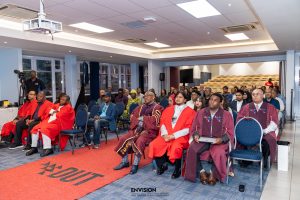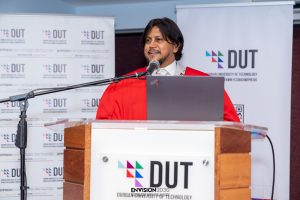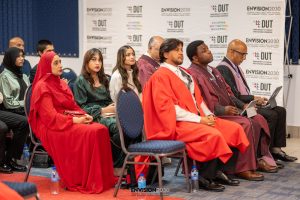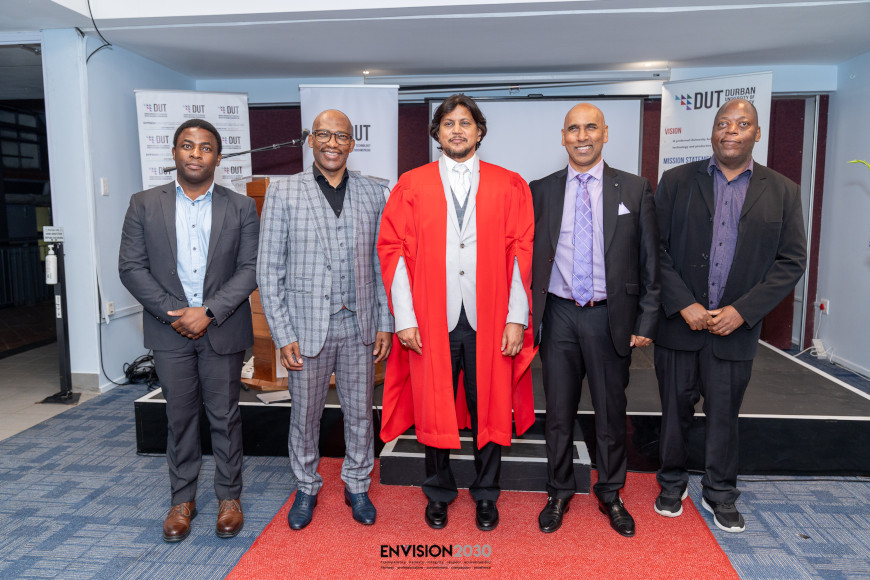The Durban University of Technology (DUT) hosted the inaugural professorial lecture of Professor Feroz Mahomed Swalaha, who is the Head of Department: Biotechnology and Food Science, full professor in the Department of Biotechnology and Food Science, in the Faculty of Applied Sciences. The inaugural lecture took place at the DUT Hotel School in Ritson Campus on Wednesday, 28 February 2024.
Programme Director for the evening was Senior Director of Corporate Affairs, Alan Khan, who extended a warm welcome the esteemed guests, DUT Vice-Chancellor and Principal, Professor Thandwa Mthembu, Deputy Vice-Chancellor: Research, Innovation and Engagement, Prof Fulufhelo Nemavhola, Executive Dean from the Faculty of Applied Sciences, Prof Suren Singh, DUT deputy deans, DUT academics, support staff and Prof Swalaha’s family and friends.
“Prof Swalaha’s journey to this momentous milestone has been characterised by his unwavering dedication, profound expertise and consistent commitment to advancing knowledge and the scholarship and for living the values and principles of the DUT ENVISION2030 strategy,” he commented.
Adding his well-wishes was DUT Vice-Chancellor and Principal, Prof Mthembu.
“It really is my singular honour as Vice-Chancellor and Principal to welcome you all and also to congratulate Prof Swalaha on this important milestone. We are gathered here because recently Prof Swalaha was promoted to full professor in the Faculty of Applied Sciences,” he added.
Giving more insight into the person behind the professorship was Prof Singh, who indicated that Prof Swalaha’s dedication and contributions to the university over the past 25 years have been exemplary.
 Before he delved into the details of his research and academic pursuits, all attendees took a moment to acknowledge Prof Swalaha’s late father, Mahomed Swalaha Rasool. “Though he is no longer with us, his memory and teachings continue to guide Prof Swalaha each day. Prof Swalaha also remains deeply indebted to his late mother, Zulekha Rasool, who has been his pillar of strength and support. She was a remarkable woman who, despite facing many challenges after his father’s passing in 1980, managed to raise seven children with grace and ingenuity. Her resilience and unwavering love have been his constant source of inspiration. She sadly passed on during covid,” said Prof Singh.
Before he delved into the details of his research and academic pursuits, all attendees took a moment to acknowledge Prof Swalaha’s late father, Mahomed Swalaha Rasool. “Though he is no longer with us, his memory and teachings continue to guide Prof Swalaha each day. Prof Swalaha also remains deeply indebted to his late mother, Zulekha Rasool, who has been his pillar of strength and support. She was a remarkable woman who, despite facing many challenges after his father’s passing in 1980, managed to raise seven children with grace and ingenuity. Her resilience and unwavering love have been his constant source of inspiration. She sadly passed on during covid,” said Prof Singh.
Prof Singh also spoke of Prof Swalaha’s wife Anisa, and his two beautiful daughters, Nafeesa, and Naseeha.
“Prof Swalaha admits that his journey through academia has been driven by a deep-seated curiosity and a passion for mathematical modeling of biological systems. This passion has been nurtured by his mentors, Prof Hamanth Kasan and the late Prof Bharti Odhav, who have guided him through the complexities of his research. Prof Swalaha boasts an impressive academic background, highlighted by the attainment of a Doctorate in Technology from DUT in 2010,” he said.
Prof Singh elaborated that Prof Swalaha had throughout his academic career, consistently exhibited excellence and dedication to his studies.
“A notable point of commonality is that we pursued our Honours and Masters degrees together at UDW in the late 1980s and early 1990s, serving as Graduate Assistants together. During this time, I came to greatly admire Prof Swalaha’s focus on statistical approaches, which he used to substantiate his scientific findings. He also displayed cosmic ideologies with deep blackhole theories,” he remarked.
Prof Singh further commented that Prof Swalaha has been a dedicated academic, and has built a remarkable career path, demonstrating strong leadership, scientific expertise, and strong commitment and dedication in various roles at DUT.
“What must be noted is his mind map approach to rollout solutions in his management armoury, I’m not sure whether it was a smoke screen to create confusion or keep his staff thinking all the time. The other leadership change was his ruffled hairstyle and three-piece suit make over or rather dress over. I’m not sure what will happen after this day,” chuckled Prof Singh.
Prof Singh indicated that Prof Swalaha’s NRF C2 rating in 2022 shows his class as a strong researcher in biotechnology and more specifically in water technology.
“As he continues to inspire students and researchers alike, his impact on the field of biotechnology and beyond is immeasurable.
Prof Swalaha, thank you for your support and leadership and being a great science ambassador, may you continue to achieve great success in your research endeavours and continue to create waves and liquify your future, and the Faculty of Applied Sciences welcomes you to its cadre of 10 inaugurated professors,” he said ecstatically.
The time came for the man of the hour to give an overview of his topic of his lecture titled: Improving Water Quality for A Liquid Future. Prof Swalaha gave context on his topic of discussion, explaining that the water crises saying that over two billion people in the world do not have access to safe drinking water and this is exacerbated by the pollutants entering our watercourses.
“In South Africa, we have rapid industrialisation and uncontrolled urbanisation, leading to strain on the distribution and failure of treatment systems. There is an urgent need to develop technologies to treat pollutants in water to restore its safe supply and prevent environmental degradation. Research in the water sector is thus crucial for preserving and maintaining this vital resource,” he stressed.
Prof Swalaha professed that there are challenges of rapid urbanisation and uncontrolled development in cities that strains the reticulation and treatment systems which are unable to cope with the massive increase in water demand.
He indicated that the consequences have been the failure of pump stations and treatment plants where raw sewage is going into the rivers and oceans, leading to the blockages in sewage pipes which are unable to manage volumes, consequently resulting in increased pollutants.
Prof Swalaha spoke of the urgent and ongoing need for water treatment technologies, detailing water scarcity where South Africa’s precipitation is below world average (464 vs 990 mm). He delved into the industrial pollution, climate change and erosion and sedimentation.
He then focused on the usage of waste materials from water to treat water and unpacking the science of metal adsorption on biological surfaces, domestic and industrial sludges, polysaccharides from these sludges and individual microorganisms which include planktonic and filamentous bacteria.
Prof Swalaha then focused his presentation on methods of binding metals to microorganisms, the mathematical modelling of metal adsorption to microorganismsand chromate as a major pollutant.
Prof Swalaha further commented on chromate reduction using continuous upflow-packed columns packed with immobilised bacterial consortia and assessment of imported biomass for metal biosorption. He explored further on column biosorption cycles, sharing some conclusions saying that various microorganisms and their components displayed heavy metal binding and removal capabilities from contaminated water.
“Mechanisms are immensely complex and have many possible routes including uptake, chemical oxidoreduction, surface adsorption and enzymatic modification. Descriptive modelling methods help us to understand mechanisms and the potential of these organisms,” he stressed.
Prof Swalaha shared more on wastewater treatment-urban runoff.
“Accumulating various heavy metals in the roots of plants and Kyllinga nemoralis, had a greater propensity for adsorbing Ni Cu and Pb. Pathogens were also efficiently filtered out up to 98% efficiency were organisms such as Salmonella, Candida, and E. coli along with various coliphages. Also, Ascaris lumbricoides was more efficiently removed by the planted system of the rhizofilter,”he stressed.
Prof Swalaha commented that wastewater can be re-used to produce valuable products such as vitamins, food, and pharmaceutical products.
“Energy can be generated from wastewaters using microorganisms to close green cycle.Carbon can also be sequestered from environment with the microbial biomass having other applications. We are not tapping the enormous potential of microbial factories at our disposal,” he professed.
He highlighted on the hazards monitoring in water, saying that there are strong correlations between faecal indicator bacteria and coliphages. He emphasised that there is a poor correlation between indicator bacterial and viral pathogens, and treatments are available from the natural environment. Prof Swalaha gave a snapshot of what’s next in terms of the liquid future.
“Old tactics do not have applicability in new environment. Centralised water treatment is often the least advanced technology. Also, the hierarchical approach slows maintenance and upgrading,” he said.
Prof Swalaha indicated that decision-making was centralised leading to long delays in implementing change.
“Water integrity needs to be strategised to be the top of the political agenda. We need climate-sensitive solutions to ensure longevity of systems,” he stressed.
One of the possible solutions as mentioned by Prof Swalaha in his presentation, is to look at creating a model that is community-driven rather than company-driven, and in terms of the future, to delve into visualised solutions to problems, pro-action rather than reaction as well as response planning for future issues.
Rounding up his presentation, Prof Swalaha thanked the oganisers, colleagues, Dr Shan Ramluckan, Mr Harri Narismulu, Prof Faizal Bux, Prof Hamanth Kasan, Prof Bharti Odhav, Dr George Tivchev, his exceptional department, his family, his parents, and extended family.
Deputy Vice-Chancellor: Research, Innovation and Engagement, Prof Nemavhola concluded the event with a vote of thanks.
Pictured: Left to Right: Deputy Vice-Chancellor: Research, Innovation and Engagement, Prof Fulufhelo Nemavhola, Vice-Chancellor and Principal, Prof Thandwa Mthembu, Executive Dean from the Faculty of Applied Sciences, Prof Suren Singh, Professor Feroz Mahomed Swalaha and Prof Tukayi Kudanga, at the inaugural lecture.
Photography: Khulasande Tshayile
Waheeda Peters

